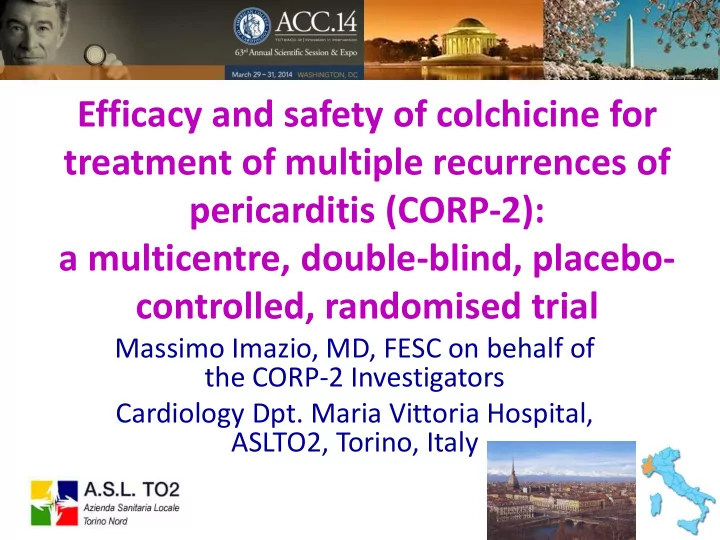

Efficacy and safety of colchicine for treatment of multiple recurrences of pericarditis (CORP-2): a multicentre, double-blind, placebo- controlled, randomised trial Massimo Imazio, MD, FESC on behalf of the CORP-2 Investigators Cardiology Dpt. Maria Vittoria Hospital, ASLTO2, Torino, Italy
Conflicts of interest: None Funding: The CORP-2 trial was supported by the former Azienda Sanitaria 3 of Torino (now ASLTO2) within the Italian National Health Service. Acarpia (Madeira, Portugal) provided the study drug and placebo as an grant . unrestricted Off-label use: colchicine for pericarditis but also all other therapies (i.e. NSAID) are off-label. This trial is registered with ClinicalTrials.gov, number NCT00235079.
Background Clinical trials have shown that low-dose colchicine (0·5 – 1·0 mg daily) is efficacious and safe for treatment and prevention of acute pericarditis and first recurrences. RRR CORP trial 0.56 NNT=3 Ann Intern Med 2011; 155: 409 – 14
Heart 2012;98:1078-1082
ICAP trial (Acute Pericarditis) RRR 0.56 NNT= 4 N Engl J Med 2013; 369: 1522 – 28
CORP-2: Aim To assess the efficacy and safety of colchicine to treat patients with multiple recurrences of pericarditis (≥ 2). CO lchicine for R ecurrent P ericarditis- 2 J Cardiovasc Med (Hagerstown) 2007; 8: 830 – 34
Diagnostic criteria
Methods We assumed that 30% of patients would have recurrent pericarditis in the placebo group at 18 months and estimated that colchicine could reduce the proportion of patients with recurrent pericarditis by half. With a two- sided % level of 0·05, a total enrolment of 240 patients was needed to attain power of 0·80 to detect a 15% absolute reduction in the proportion of participants who had recurrent pericarditis in the colchicine group.
Inclusion criteria Consecutive patients aged 18 years or older with two or more recurrences of pericarditis (idiopathic, viral, post-cardiac injury, or caused by connective tissue disease).
Exclusion criteria Tuberculous, neoplastic, or purulent pericarditis etiology; Severe liver disease or current aminotransferase concentrations more than 1·5 times the upper limit of the normal; Serum creatinine concentration more than 221·00 μmol /L; Skeletal myopathy or serum creatine kinase concentration more than the upper limit of the normal; Blood dyscrasia; Inflammatory bowel disease; Hypersensitivity to colchicine or other contraindication to colchicine; Current treatment with colchicine; Life expectancy of 18 months or less; Pregnant or lactating women or women of childbearing potential not using contraception; Evidence of myopericarditis as indicated by any increase of serum troponin concentration.
Recurrent pericarditis (≥2) Placebo on top of Colchicine on top of standard anti- standard anti- inflammatory therapy inflammatory therapy) (0·5 mg twice daily for 6 months for patients >70 kg or 0·5 mg once daily for patients ≤ 70 kg) in addition to conventional anti- inflammatory treatment with aspirin, ibuprofen, or indometacin.
Results
Trial profile Lancet 2014; published today
Baseline data Lancet 2014; published today
Outcomes Lancet 2014; published today
Recurrence-free RR 0.49 Survival NNT= 5 Lancet 2014; published today
Safety: side effects Lancet 2014; published today
Study limitations Specific populations were excluded (children, pregnant or lactating women, and patients with potential contraindications or at high risk of complications after the administration of colchicine). Specific etiologies of pericarditis were also excluded (bacterial or neoplastic pericarditis). Thus, our results should only be applied to populations that were eligible for the study. At present, colchicine is not approved for treatment of recurrent pericarditis in North America or Europe, and its use as such is off-label. Study sample size and length of follow-up might have precluded identification of rare adverse effects or long-term effects of the drug. Arbitrary length of therapy for colchicine (6 months): further research is needed to identify the best duration of colchicine treatment for recurrences. A longer treatment duration (6 – 12 months) might further decrease recurrences.
Conclusions Colchicine added to conventional anti- inflammatory treatment significantly reduced the rate of subsequent recurrences of pericarditis in patients with multiple recurrences. Taken together with results from other randomised controlled trials, these findings suggest that colchicine should be probably regarded as a first-line treatment for either acute or recurrent pericarditis in the absence of contrandications.
Full paper published online today
Recommend
More recommend